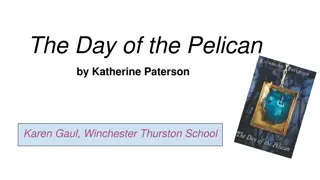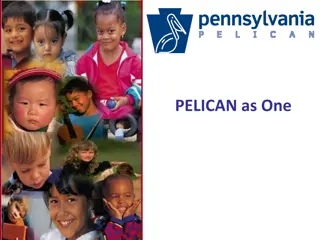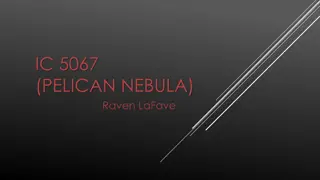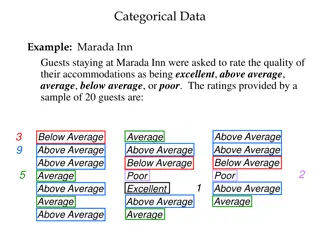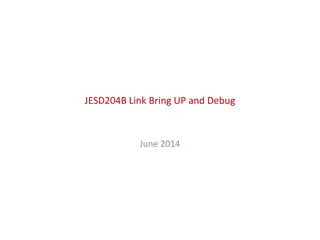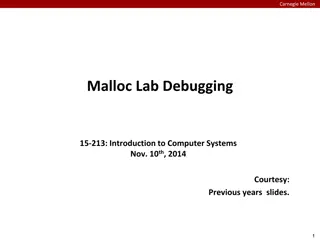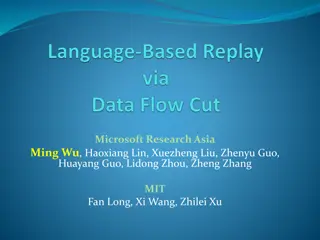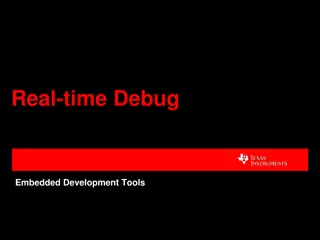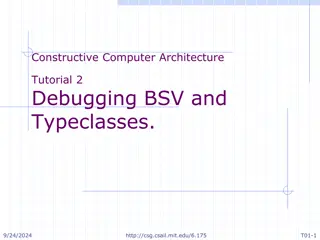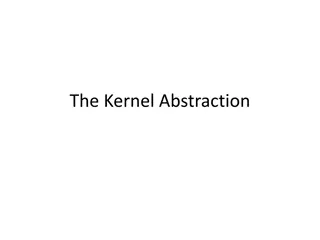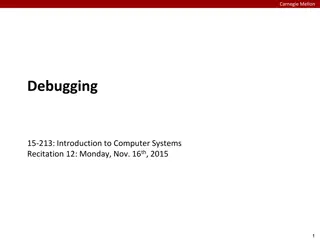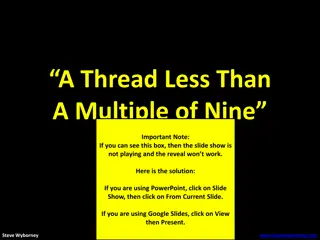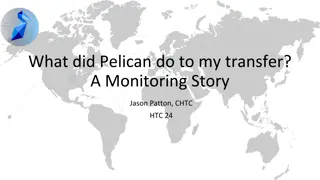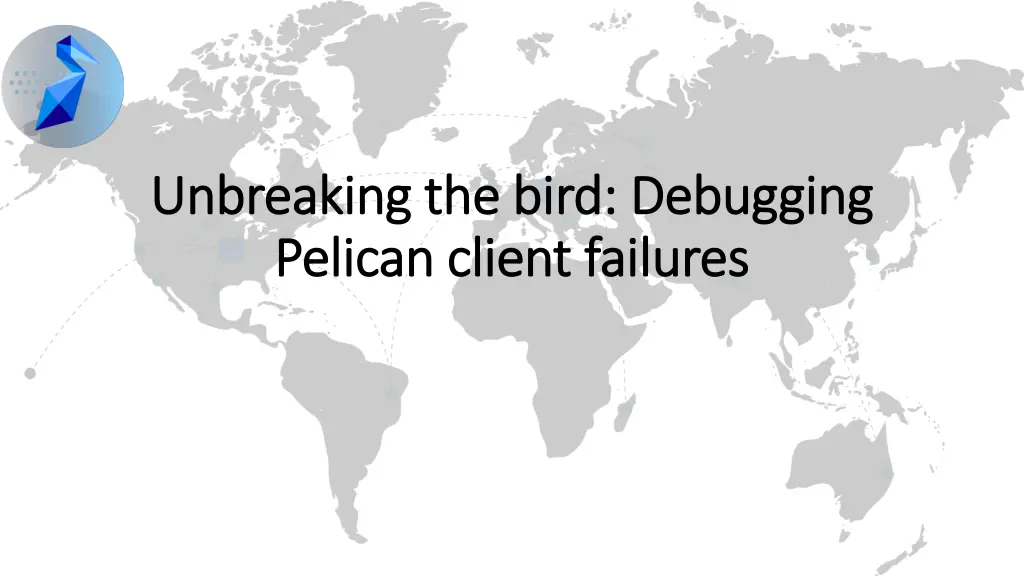
Troubleshooting Pelican Client Errors During File Transfers
Discover how to troubleshoot Pelican client errors during file transfers, such as failed downloads and upload issues, caused by various protocols and server responses. Learn about common scenarios and solutions to ensure efficient data transfer operations.
Download Presentation

Please find below an Image/Link to download the presentation.
The content on the website is provided AS IS for your information and personal use only. It may not be sold, licensed, or shared on other websites without obtaining consent from the author. If you encounter any issues during the download, it is possible that the publisher has removed the file from their server.
You are allowed to download the files provided on this website for personal or commercial use, subject to the condition that they are used lawfully. All files are the property of their respective owners.
The content on the website is provided AS IS for your information and personal use only. It may not be sold, licensed, or shared on other websites without obtaining consent from the author.
E N D
Presentation Transcript
Unbreaking the bird: Debugging Unbreaking the bird: Debugging Pelican client failures Pelican client failures
condor_q -held | grep osdf So you walked into the office the morning and checked on the workloads that ran overnight. Oh no! It looks like OSDF caused all sorts of errors overnight. What do you do?! N.b. we re on your side! Every morning we check in on how many problems there were caused by OSDF on the previous day An AI-generated nightmare courtesy of Copilot.
So your Pelican-power download failed 12635414.5 XXXXXXXXX 5/6 10:46 Transfer output files failure at execution point slot1_1@glidein_25498_139089762@n3303.hyak.local using protocol osdf. Details: Pelican Client Error: failed upload to ap40.uw.osg-htc.org:8443: Request failed (HTTP status 423) (100ms since start) (Version: 7.15.1; Site: UW-IT) ( URL file = osdf:///ospool/ap40/data/XXXXXXXX/Leukemia_project/mapped_reads.tar.gz )| 12633237.34371217 XXXX 5/29 11:06 Transfer input files failure at execution point slot1_4@glidein_431023_509537431@node077.cluster using protocol osdf. Details: Error occurred when querying for metadata: Get "https://osg-htc.org/.well-known/pelican-configuration": read tcp 10.1.0.77:60654- >104.21.71.171:443: read: connection reset by peer ( URL file = osdf:///ospool/ap40/data/ XXXX /unzip )| 12637464.20 XXXX 5/30 07:47 Transfer input files failure at the execution point using protocol osdf. Details: Pelican Client Error: Attempt #3: from dtn-pas.kans.nrp.internet2.edu:8443: request failed (HTTP status 404): server returned 404 Not Found (100ms elapsed, 300ms since start); Attempt #2: from osdf-uw-cache.svc.osg- htc.org:8443: request failed (HTTP status 404): server returned 404 Not Found (0s elapsed, 100ms since start); Attempt #1: from osdf1.chic.nrp.internet2.edu:8443: request failed (HTTP status 404): server returned 404 Not Found (0s since start) (Version: 7.16.5; Site: NotreDame) ( URL file = osdf:///ospool/ap40/data/XXXX/freesurfer- v7.2.0.sif )|
So your Pelican-power download failed 12633237.34981197 XXXXXX 5/30 02:23 Transfer input files failure at the execution point using protocol osdf. Details: Pelican Client Error: Attempt #3: from dtn-pas.kans.nrp.internet2.edu:8443: dial tcp [2001:468:2807::5]:8443: connect: connection refused (10s elapsed, 30s since start); Attempt #2: from dtn- pas.hous.nrp.internet2.edu:8443: dial tcp 163.253.29.19:8443: i/o timeout (10s elapsed, 20s since start); Attempt #1: from osg-houston-stashcache.nrp.internet2.edu:8443: dial tcp 163.253.74.2:8443: i/o timeout (10s since start) (Version: 7.16.5; Site: UChicago) ( URL file = osdf:///ospool/ap40/data/ XXXXXX/unzip )| 12633237.35036992 XXXXXX 5/30 03:57 Transfer input files failure at execution point slot1_15@glidein_54145_51861151@n3402.hyak.local using protocol osdf. Details: Pelican Client Error: Attempt #2: from dtn-pas.denv.nrp.internet2.edu:8443: failed to verify size of downloaded file on disk: file size on disk 28671565b does not match expected size 28655181b (2m8.7s elapsed, 4m18.7s since start); Attempt #1: from ncar-cache.nationalresearchplatform.org:8443: Transfer.SlowTransfer Error: Error code 6002: cancelled transfer, too slow; detected speed=27.4 KB/s, total transferred=6.6 MB, total transfer time=2m10.001s (2m10s since start) (Version: 7.16.5; Site: UW-IT) ( URL file = osdf:///ospool/ap40/data/XXXXXX/chunkout/nt_virus_chunks/nt_virus_subset_zkwt )|
Mea Culpa Yes, we have work to do to improve the error messages Yes, we should have better tools to aggregate/filter these messages Yes, we are putting structured data in an unstructured string Yes, presenting the user with an error message they can resolve is a problem in the first place
What we want to avoid The Pelican team wants to provide enough structured failure information about what happened that you avoid the trap of: Let me rerun is using pelican object copy --debug and reading the tea leaves
Thinking Logically about Failures Downloading one byte of data requires 2-3 services to interact successfully. Understanding the basic architecture is essential for understanding what s gone wrong: Service discovery: Used to find the director service. Director: Contacted by the client to discover a service for performing the desired operation. Cache: Selected by the director, sends the object to the client. Origin: On cache miss, sends the object to the cache For uploads, contacted directly by the client.
OSDF Director (Namespace) AWS-Open Data NCAR OSDF Origin US-West-2 OSDF Origin (NCAR) (AWS-Opendata/US-west-2) OSDF Cache [1] Pelican Get (OSDF, NCR/ Pelican Client [2] Pelican Get (OSDF, AWS- [3] Visualize ( Jupyter Notebook Researcher uses a Jupyter Notebook to create a visualization that requires two objects: rda/harshah/osdf_data/HadCRUT.5.0.2.0.analysis.summary_series.global.monthly.zarr @ NCAR Object Store NCAR NCAR/ /rda/harshah/osdf_data/HadCRUT.5.0.2.0.analysis.summary_series.global.monthly.zarr West- -2 2/ /cmip6-pds/CMIP6/CFMIP/NCAR/CESM2/aqua-4xCO2/r1i1p1f1/Amon/co2mass/gn/v20190816 @ NCAR Object Store cmip6-pds/CMIP6/CFMIP/NCAR/CESM2/aqua-4xCO2/r1i1p1f1/Amon/co2mass/gn/v20190816 @ AWS Open Data Object Store AWS AWS- -OpenData OpenData/US /US- -West @ AWS Open Data Object Store 8
Picking apart a hold message 12633237.35036992 XXXXXX 5/30 03:57 Transfer input files failure at execution point slot1_15@glidein_54145_51861151@n3402.hyak.local using protocol osdf. Details: Pelican Client Error: Attempt #2: from dtn-pas.denv.nrp.internet2.edu:8443: failed to verify size of downloaded file on disk: file size on disk 28671565b does not match expected size 28655181b (2m8.7s elapsed, 4m18.7s since start); Attempt #1: from ncar- cache.nationalresearchplatform.org:8443: Transfer.SlowTransfer Error: Error code 6002: cancelled transfer, too slow; detected speed=27.4 KB/s, total transferred=6.6 MB, total transfer time=2m10.001s (2m10s since start) (Version: 7.16.5; Site: UW-IT) ( URL file = osdf:///ospool/ap40/data/XXXXXX/chunkout/nt_virus_chunks/nt_virus_subset_zkwt )| Information about the transfer: Host: n3402.hyak.local Site: UW-IT Pelican Version: 7.15.6 URL: osdf:///ospool/ap40/data/ Which do you think is useful?
Picking apart a hold message 12633237.35036992 XXXXXX 5/30 03:57 Transfer input files failure at execution point slot1_15@glidein_54145_51861151@n3402.hyak.local using protocol osdf. Details: Pelican Client Error: Attempt #2: from dtn-pas.denv.nrp.internet2.edu:8443: failed to verify size of downloaded file on disk: file size on disk 28671565b does not match expected size 28655181b (2m8.7s elapsed, 4m18.7s since start); Attempt #1: from ncar-cache.nationalresearchplatform.org:8443: Transfer.SlowTransfer Error: Error code 6002: cancelled transfer, too slow; detected speed=27.4 KB/s, total transferred=6.6 MB, total transfer time=2m10.001s (2m10s since start) (Version: 7.16.5; Site: UW-IT) ( URL file = osdf:///ospool/ap40/data/XXXXXX/chunkout/nt_virus_chunks/nt_virus_subset_zkwt )| If the Pelican client considers the error non-fatal, it ll make 3 attempts to download an object. From above: Attempt #1: Attempt #2: Service: ncar- cache.nationalresearchplatform.org:8443 Error: Transfer.SlowTransfer Error: Error code 6002: cancelled transfer, too slow; detected speed=27.4 KB/s, total transferred=6.6 MB, total transfer time=2m10.001s. Timing: 2m10s since start Service: dtn- pas.denv.nrp.internet2.edu:8443 Error: failed to verify size of downloaded file on disk: file size on disk 28671565b does not match expected size 28655181b Timing: 2m8.7s elapsed, 4m18.7s since start The second attempt was considered fatal!
Step one: Client finds a service The client first discovers the location of the director service from a static file hosted on CloudFlare. 32684753.93699 XXXXXX 5/31 11:08 Transfer output files failure at execution point slot1_7@glidein_48968_35485290@n3353.hyak.local using protocol osdf. Details: Federation metadata discovery failed with HTTP status 502. Error message: Cloudflare encountered an error processing this request: Bad Gateway ( URL file = osdf:///ospool/ap20/data/XXXXXX/ClusterResult0to50_93405.RData )| The client asks the director to select a service (cache) to do the work. 32684753.26096 XXXXXX 5/28 06:31 Transfer input files failure at execution point slot1_11@glidein_1199_243426792@compute38 using protocol osdf. Details: failed to get namespace information for remote URL osdf:///ospool/ap20/data/XXXXXX/Result_31513.RData: error while querying the director at https://osdf-director.osg-htc.org: Get "https://osdf-director.osg- htc.org/ospool/ap20/data/ahl/GridGraphs/Result_31513.RData": dial tcp [2607:f388:2200:c3::3]:443: connect: network is unreachable ( URL file = osdf:///ospool/ap20/data/XXXXXX/Result_31513.RData )|
What needs to happen to send one byte? For a given cache, what needs to work to send a single byte: DNS lookup of the service name. Establish TCP connection from client to server. TLS handshake. Client sends HTTP request to server. Server sends HTTP response headers. Server sends one byte of data. How can this go wrong?!?
DNS, TCP, TLS, HTTP dial tcp: lookup fdp-d3d-cache.nationalresearchplatform.org on 10.24.255.254:53: server misbehaving DNS: TCP: dial tcp [2607:f388:2200:c3::3]:443: connect: network is unreachable TLS: net/http: TLS handshake timeout HTTP: timeout waiting for HTTP response (TCP connection successful)
DNS, TCP, TLS, HTTP dial tcp: lookup fdp-d3d-cache.nationalresearchplatform.org on 10.24.255.254:53: server misbehaving DNS: Text generated by OS TCP: dial tcp [2607:f388:2200:c3::3]:443: connect: network is unreachable Text generated by Go (programming language) runtime TLS: net/http: TLS handshake timeout Text generated by Pelican team HTTP: timeout waiting for HTTP response (TCP connection successful)
One byte went through now what? Once a HTTP/1 server sends its response headers, it must send the full body. what happens if there is a read error on byte 2? There is no post-header error signal. Only option is for the HTTP server to abruptly close the connection: the dreaded EOF ( end of file ) error. Attempt #2: from dtn-pas.hous.nrp.internet2.edu:8443: unexpected EOF (4s elapsed, 14.1s since start) The following are identical in HTTP/1: The origin encountered a read error. The cache encountered a read error. There was a network connectivity issue at the client. Do you want to debug the network connectivity at every possible client location?!?
A small tweak on HTTP To help differentiate between failure cases, we allow the Pelican client to indicate an error after the download starts (opt-in). Translates to an error message like this: transfer error: Unable to read (...Path...); timer expired
A tweak on HTTP To help differentiate between failure cases, we allow the Pelican client to indicate an error after the download starts (opt-in). Translates to an error message like this: transfer error: Unable to read (...Path...); timer expired Writing error messages are hard! In English, this translates to origin timed out when bytes were requested by the cache .
Is condor_q held | grep osdf good? Grep ing through a bunch of error messages to poke at failures randomly is not particularly structured thinking! What are some better approaches? Ideas: Use condor_history to view individual ClassAds. Find a friend running ElasticSearch and condor_adstash
condor_history knows all! The -transfer-history flag allows you to pick through all the individual attempts. You re welcome to attempt to be a command line junkie to script this output!
condor_history knows all! The -transfer-history flag allows you to pick through all the individual attempts. You re welcome to attempt to be a command line junkie to script this output! One default output method is JSON which is particularly scriptable.
Not everyone loves the CLI, Brian! More of a database person? ElasticSearch provides a document- centric data model from a browser environment.
Not everyone loves the CLI, Brian! More of a database person? ElasticSearch provides a document- centric data model from a browser environment.
Some thoughts 1. Don t bother memorizing error messages. We are trying to constantly change and improve them. 1. Instead: complain to us about how we can communicate better! Think through the logical steps of what Pelican is doing. Where, precisely, did the error happen? 1. Director versus a cache? 2. DNS, TCP, TLS, or HTTP? 3. Before bytes moved or after? 4. Which can you control versus just retry? 5. The Pelican signals to HTCondor when it believes the error is retryable. Let HTCondor run the transfer so you can state your retry policy. Spend more time thinking about aggregate errors and less about the individual failures. Reach out to the Pelican team with ideas for better tools! 2. 3. 4. 5.
Questions? This project is supported by the National Science Foundation under Cooperative Agreements OAC-2331480. Any opinions, findings, conclusions or recommendations expressed in this material are those of the authors and do not necessarily reflect the views of the National Science Foundation.





